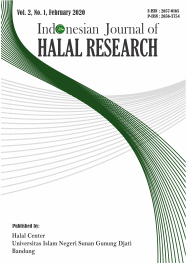The Impact of Food on Muslims Spiritual Development
DOI:
https://doi.org/10.15575/ijhar.v2i1.7870Keywords:
fiqh muamalah, food, spiritual developmentAbstract
Islam is a religion that regulates all aspects of human beings. Muslims in Indonesia generally focus on the discussion about fiqh ibadah, but less concern on many aspects of fiqh muamalah. If it is not understood correctly, doubtful (syubhat) goods and services leading to haram might be consumed by the muslims and influenced their spiritual development. This study aims to explain the impact of food consumption on the spiritual development in Islam. The finding of this study indicates the influence of food consumed by humans might affect psychological aspects, such as emotion. The consuming habits without considering halal and haram, or anything materialistic will lead to temporary satisfaction. Whatever is developed by such people, whether science, technology, creativity, and any innovation, will bring damage or danger to the survival of humans, society, and the natural surroundings.
References
Afroniyati, L. (2014). Analisis Ekonomi Politik Sertifikasi Halal oleh Majlis Ulama Indonesia. Jurnal Kebijakan dan Administrasi Publik, 18(1).
Ahmad, Muflih, B. K. et al. (2017). The Concept and Component of Contaminated Animals (Al Jalalah Animals). International Food Research Journal 24.
Arif, M. I. et al. (2018). Najis (Tinja) Manusia daripada Prespektif Sains dan Islam serta Amalan Pemakanan Sunnah. Sains Malaysiana, 47(6).
BADAN NARKOTIKA NASIONAL. (2015). Dampak dan Bahaya Narkoba. Jakarta: PT. Tirta Asih Jaya
Hamka. (2015). Tafsir Al Azhar Juz 1, 2, 3. Depok: Gema Insani Press
Heryati, Euis dan Nur Faizah R. (2008). Psikologi Faal. Bandung: Diktat Kuliah Ilmu Pendidikan. Universitas Pendidikan Indonesia.
KOMPAS-Life Style. (2019). Mengapa Makanan Bisa Mempengaruhi Mood Kita?. Diakses pada Hari Selasa, 26-11-2019. Pukul. 17. 31
Kurniawan, Andree Tiono. (2015). Perkembangan Jiwa Agama pada Anak. Sekolah Tinggi Agama Islam (STAIN) Jurai Sewo Metro Lampung. Vol. 1. Edisi. 1
Muhaimin. (2005). Pengembangan Kurikulum Pendidikan Agama Islam. Jakarta: PT. Raja Grafindo Persada.
Nurcahyo, Heru. (2005). Biologi SMA Kelas 1. Sistem Pencernaan Makanan. Kalasan: Dosen Jurdik Biologi FMIPA UNY.
Sains Ensiklopedi. (2015). Ensiklopedi Sains Islami Biologi-2. Tangerang: PT. Kamil Pustaka.
Salim, Ahmad Husain. (2009). Al Maradh Wasy Syifa Fil Quranil Kariim (Diterjemahkan: Menyembuhkan Penyakit Jiwa dan Fisik. Penerjemah: Ali Nurdin). Depok: Gema Insani Press.
Sawari, Siti Salwa BTE MD. (2017). The Relation of Halal Food Consumption and Psychological Features of Muslim Students in Malaysian Public Universities. Thesis. Faculty of Islamic Civilization. Universiti Teknologi Malaysia.
Shihab, Quraisy. (2002). Tafsir Al Mishbah, Pesan, Kesan dan Keserasian Al Quran. Vol. 1 dan 2. Jakarta: Lentera Hati.
Sulthon. (2016). Pola Keberagamaan Kaum Tuna Netra dan Dampak Psikologis Terhadap Penerimaan Diri. Sekolah Tinggi Agama Islam Negeri (STAIN) Kudus. 4(1).
Wahab, Muhammad Abdul. (2018). Pengantar Fiqih Muamalat. Jakarta: Rumah Fiqih Publishing.
Yatsab, Rezky A. et al. (2014). Hubungan Kinerja Otak dan Spiritualitas Manusia Diukur Dengan Menggunakan Indonesia Spiritual Health Assessment Pada Pemuka Agama di Kabupaten Halmahera Tengah. Jurnal e-Biomedik. Fakultas Kedokteran Universitas Sam Ratulangi Manado, (2)2.
Downloads
Published
How to Cite
Issue
Section
Citation Check
License
Copyright (c) 2020 Indonesian Journal of Halal Research

This work is licensed under a Creative Commons Attribution-ShareAlike 4.0 International License.
Authors who publish in Indonesian Journal of Halal Research agree to the following terms:
- Authors retain copyright and grant the journal right of first publication with the work simultaneously licensed under a Creative Commons Attribution-ShareAlike 4.0 International (CC BY-SA 4.0) License that allows others to share the work with an acknowledgment of the work's authorship and initial publication in this journal.
- Authors are able to enter into separate, additional contractual arrangements for the non-exclusive distribution of the journal's published version of the work (e.g., post it to an institutional repository or publish it in a book), with an acknowledgment of its initial publication in this journal.
- Authors are permitted and encouraged to post their work online (e.g., in institutional repositories or on their website) prior to and during the submission process, as it can lead to productive exchanges, as well as earlier and greater citation of published work (See The Effect of Open Access).

Indonesian Journal of Halal Research by Halal Center UIN Sunan Gunung Djati Bandung is licensed under a Creative Commons Attribution-ShareAlike 4.0 International License.
Based on a work at https://journal.uinsgd.ac.id/index.php/ijhar.

















